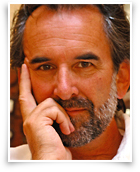
Richard Harvey
connecting psychotherapy and spiritual growth for human awakening
Interview on A New Model of Therapy
Richard Harvey answers questions about a new model of therapy.
For many people today psychotherapy is associated exclusively with mental illness. The traditional picture of the patient lying on the therapy couch with the doctor writing in a notebook still prevails. But there have been many changes and developments in psychotherapy and notably in psycho-spiritual therapy. Could you say something about this?
Psychotherapy, therapy, healing, as I use these terms, may be different from what some people expect. In the sixties, a new model of therapy developed which had its roots in humanistic psychology and transpersonal psychology. The main points of departure were, first, that the client or patient was considered self-responsible, and motivated towards well-being.
Second, the therapist was a facilitator or guide in the service of the client’s (we didn’t say patient) process which is to say that the means by which clients realized their potential was always in their own hands (facilitated by the therapists), rather than subject to the whims, control and interventions of the so-called “expert approach” which had been the case with the previous psychologies (psychoanalysis and behaviorism) as they were applied in psychotherapy.
Third, therapy focused on the individual’s potential and stressed the importance of growth and self-actualization. The fundamental belief of humanistic psychology was that people are innately good, and mental and social problems result from deviations from this natural tendency.
But in spite of this, we still see the psychotherapist as an expert, do we not?
Yes, we continue to think of psychotherapy, like psychoanalysis, in a medical model executed by the, as you say, expert or doctor who will make you feel better, and therapy as a treatment that will make you well.
Psychotherapy is not “a cure”. The course of therapy may take you through a stage of feeling much worse, a stage which is mercifully followed often by a healing, radical change or transformation.
People are still stuck in the notion of psychotherapy as a fix, a cure, a palliative. Short-term therapy or counseling may provide that. But it is the task of transformative therapy to do much, much more: to bring about a second birth.
What is the “second birth” and how is it brought about?
Through healing deeply and thoroughly the wounds of the past, balancing the energies of the body—psychologically, emotionally, mentally, physically and spiritually—and facilitating, allowing and guiding people to give birth to their psyche or soul.
This “second birth” is the one that awaits everyone who is born a human being: it holds the possibility of true potential—the realization of one’s true nature. It is therefore without doubt hazardous, difficult and not for everyone. But that doesn’t mean we shouldn’t be able to try.
What about criticisms of therapy and personal growth?
Therapy will always have its detractors I am sure. When it works, there are the cynics and when it doesn’t there’s a host of things that therapy takes the fall for. When your friend or relative is in distress and you find it intolerable to allow their suffering without intervention, problem-solving or making well-meant suggestions you are only being human after all. It’s not easy to see someone you love suffer. And yet suffering is not all bad! In depth psychotherapy we put ourselves on the line, by embracing suffering consciously in the name of healing and discovering who we really are.
We respect and validate the suffering and ordeal of, say, mountaineers, sports men and women, and people involved in voluntary work in third world countries. These people embrace suffering for the positive outcome their ordeal promises. But when it comes to inner work, inner processes, psycho-spiritual descent and rituals of initiation we have to refer to primitive cultures, often in the distant past, to find an equivalent sense of honor and reverence for the ordeal of the inner journey.
Share this interview
- Print this interview
- Download this interview
- Email this page to a friend

- Bookmark and Share this interview
- back to Individual Therapy page